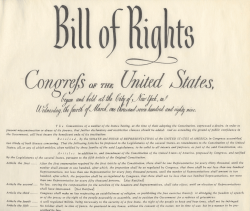
You expect anti-knowledge people like “historian” David Barton to mislead the public about US history especially when it concerns religious freedom. You don’t expect an actual historian to mislead the public. I found one yesterday who tried to defend saying prayers during government meetings. He misses the point of the 1st amendment.
According to his bio on his column, Thomas S. Kidd…
…teaches history and is a Senior Fellow at Baylor University’s Institute for Studies of Religion. He is the author of God of Liberty: A Religious History of the American Revolution, and his Patrick Henry: First Among Patriots is forthcoming this year.
His recent column is titled “Thou Shalt Not Say “Jesus”” with a subtitle of “Recent court rulings expose growing constraints on religious speech.”
The column starts talking about the reaction from the Campbell County Board of Supervisors in Rustburg, Virginia, to a recent court decision that stopped the regular use of sectarian invocations in a North Carolina case. Supervisor Steve Shockley said:
“If you’re offended by the name of Christ or Lord and Savior, you are welcome to leave the room.”
Mr. Kidd writes:
Shockley’s response was rude. But his frustration—indeed, his alarm—is understandable. How can judges forbid anyone, even elected officials, from saying certain religious words?
He then briefly goes over the evolution of what became the 1st Amendment to the Bill of Rights. He mentions what view point was adopted.
Jefferson and James Madison, supported by evangelical Baptists, disagreed with even this plural establishment and argued that the government should get out of the business of promoting any denomination. This view won the day in Virginia, and in the framing of the Bill of Rights, leading to the First Amendment’s ban on a (national) established church, and its guarantee of free exercise of religion.
Mr. Kidd next goes the usual Barton route and concludes:
Neither Jefferson nor Henry, however, could have imagined the day when judges would construe the First Amendment as restricting the religious speech of elected officials, private citizens, or clergy.
….
As I recently wrote regarding attempts to legally prohibit Texas Governor Rick Perry’s prayer rally in Houston, this kind of church-state extremism often puts traditional believers on the defensive, breeding the attitude exhibited by Steve Shockley at the Campbell County meeting. Americans have the right to use Jesus’s name (or the name of other religious figures, for that matter) in public spaces. But having a right to do something does not make it prudent or winsome. On this point I would agree with the ACLU and other secularists: public meetings like those of the Campbell County Board of Supervisors are not appropriate places for sectarian fulminations. But there’s a difference between speech that is inappropriate, and speech that should be constitutionally banned. Violating Americans’ right to free speech and free exercise of religion is not the way to address the poor manners of people like Mr. Shockley.
Mr. Kidd makes the usual theist mistake of equating prohibiting government from promoting certain religious sects as having their free speech rights violated.
How does government officials saying Christian prayers during an official meeting not contradict his earlier statement about the government getting out of the business of promoting any denomination? He can’t have it both ways.
Judeo-Christian beliefs are not generic – there are people who don’t follow those believes and if a government group or official promotes those beliefs and only those beliefs then the 1st Amendment is violated. That is the point of these kinds of court rulings.
I can also guarantee that if the issue concerned a Muslim prayer, Christians wouldn’t be complaining about THEIR rights being violated.
Also prohibiting the government from promoting particular religious beliefs doesn’t prohibit religious freedom of the individuals. Members of the Board of Supervisors can have a prayer circle prior to the start of their official meeting. They could all stand in the hallway, jump up and down, and shout “Praise Jesus” as long as they wanted.
They can also go to church on Sunday which they probably do – so Kidd’s argument that their first amendment rights are being abridged is not supported.
Mr. Kidd was right that what Shockley said was inappropriate BUT it also violated the 1st Amendment rights of the citizens he is suppose to represent just as if he led a prayer during the meeting.